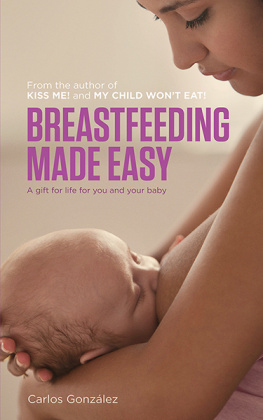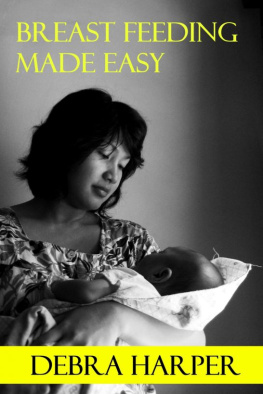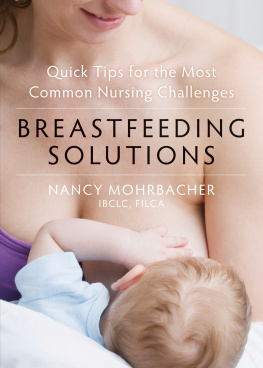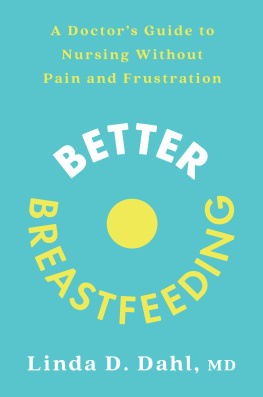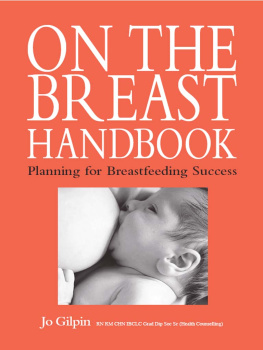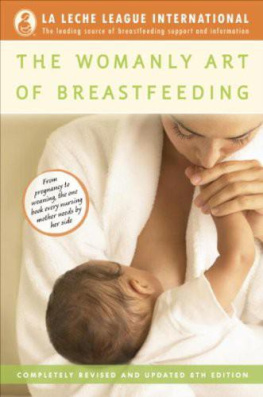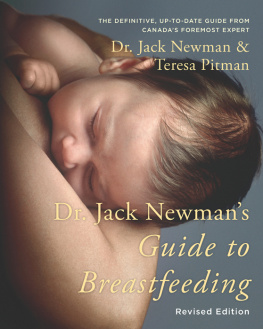BREASTFEEDING MADE EASY
About the author
Carlos Gonzlez, a father of three, studied medicine at the Universidad Autnoma de Barcelona and trained as a paediatrician at the Hospital de Sant Joan de Du. The founder and president of the Catalan Breastfeeding Association (ACPAM), he currently gives courses on breastfeeding for medical professionals. Since 1996 he has been breastfeeding correspondent for Ser Padres (Being Parents) magazine.
His books Kiss Me! How to raise your children with love and My Child Wont Eat! How to enjoy mealtimes without worry are also published by Pinter & Martin.
BREASTFEEDING MADE EASY
A gift for life for you and your baby
Carlos Gonzlez
translated by Lorenza Garcia
The information in this book is general and should not be taken as specific medical advice for individuals. If you are having problems breastfeeding, or are concerned about your baby, contact your midwife, health visitor or GP, or call the National Breastfeeding Helpline on 0300 100 0212 (UK).
Breastfeeding made easy: a gift for life for you and your baby
First published as Un regalo para toda la vida by Ediciones Planeta Madrid, S.A.
This English edition first published by Pinter & Martin Ltd 2014
Carlos Gonzlez 2006, 2009, 2014
Ediciones Planeta, Av. Diagonal 662-664, 08034 Barcelona, Spain
Translated by Lorenza Garcia
Edited by Susan Last
Index Helen Bilton
All rights reserved
ISBN 978-1-78066-020-2
The right of Carlos Gonzlez to be identified as the author of this work has been asserted by him in accordance with the Copyright, Designs and Patent Act of 1988
British Library Cataloguing-in-Publication Data
A catalogue record for this book is available from the British Library
This book is sold subject to the condition that it shall not, by way of trade and otherwise, be lent, resold, hired out, or otherwise circulated without the publishers prior consent in any form or binding or cover other than that in which it is published and without a similar condition being imposed on the subsequent purchaser
Printed in Great Britain by TJ International Ltd, Padstow, Cornwall
This book has been printed on paper that is sourced and harvested from sustainable forests and is FSC accredited
Pinter & Martin Ltd
6 Effra Parade
London SW2 1PS
www.pinterandmartin.com
CONTENTS
Her Highness Mara Victoria is so good and kind that she seems more like an ordinary woman than a queen. I doff my hat when she goes by, and forgive her for being an Italian. She nurses her children herself, you know. I hear that this summer, whilst strolling in the grounds of the Escorial Palace, she came across an abandoned child clamouring to be fed. She gathered him up, and began to suckle him, not from a bottle, Tito, but from her own breast.
Benito Prez Galds, Amadeo 1
INTRODUCTION
My interest in breastfeeding began when I first started studying medicine. I have my professor of practical anatomy to thank for this. His name, if I remember correctly, was Joaquin, and in a faculty containing thousands of students, to whom none of the professors paid much attention, he stood out as someone with a passion for teaching. As soon as he had a few students gathered round him, he would give a rousing lecture, and one of his favourite subjects was breastfeeding.
For many years I regarded breastfeeding from a doctors point of view, as the best form of nutrition, which protects against a legion of illnesses and saves thousands of lives. I thought that advocating it was in the interests of public health, and that a good mother should make every effort to breastfeed her child, because it is best for him.
Then I had three children of my own, and something changed. I saw my children nursing, being breastfed by their mother, and I had feelings of pride, admiration, astonishment, fascination, envy? I have read a great deal since then, about how fathers feel in those circumstances, and yet I still find it impossible to describe that feeling. Some things in life are too deep for words.
I understood then that breastfeeding isnt a tool for achieving health, but rather an integral part of health itself. Not a means, but an end. Telling people to avoid artificial breastfeeding because it causes diarrhoea now seems to me as absurd as exhorting them to avoid blindness because blind people are more likely to get run over. Breastfeeding is no more a way of avoiding infection than being able to see is a way of avoiding accidents. They are both normal parts of a healthy life. I know now that breastfeeding is not an effort, much less a sacrifice, that a woman makes for the good of her child, but rather that it is part of her life, of her own sexual and reproductive cycle. It is a right that no one can take away from her.
I am aware that some women dont want to breastfeed. This is fine. A right isnt the same as a duty. Many people dont go on marches or vote in elections, but they still have that right.
I didnt write this book in order to attempt to convince mothers to breastfeed, but rather to help those who want to do so to achieve their aim. I make this very clear in the title, and those who prefer to bottle feed can buy other books.
Some might find it surprising that a man should write about breastfeeding. I wont for a moment try to conceal the fact that Ive never breastfed. People who know how to do something do it, people who dont write books.
Chapter 1
HOW THE BREAST WORKS
To the consumers taste
Fifty years ago, it was a commonly held and mistaken belief that women produced a fixed amount of breastmilk, and that some had a lot while others had a little. Some had a weeks worth, others two months worth, but when it stopped that meant the well had run dry. And of course a mothers milk could also be good or bad. These were things you simply had or didnt have; if you were lucky you had plenty of good-quality milk and could breastfeed, and your child would grow up to be strong and handsome. If you didnt have much milk, or it was watery, then there was nothing you could do. How fortunate that they invented the bottle! Nothing a mother did or didnt do would change the outcome: if you knew a mother who had breastfed for three months (which in those days was an achievement), or for more than six months (which was downright eccentric), it would never have occurred to you to say: I wish I could breastfeed my baby, tell me how you do it! You would simply declare, with a measure of envy: Youre so lucky to have milk! I wish Id had enough to breastfeed my baby! (In fact, to tell the truth, the most frequent remark was: I dont know why you put yourself through breastfeeding, I bottle fed mine and hes a picture of health).
And yet, wasnt it a huge coincidence that while European women had almost no milk, African mothers had plenty? Of course, it was a question of race; black women produced more milk, as did gypsies, while white women simply didnt (there were those, of course, who argued that this was because blacks and gypsies were primitive races). In that case, how was it that the European mothers grandmothers, who belonged to the same race, had plenty of milk? Opinion here was divided. Some believed the stresses of modern life had put an end to lactation (I will talk more about this on page 27), others that this was an example of evolution in action: an organ that wasnt used would atrophy and soon little girls would be born without breasts (as if little girls were ever born

